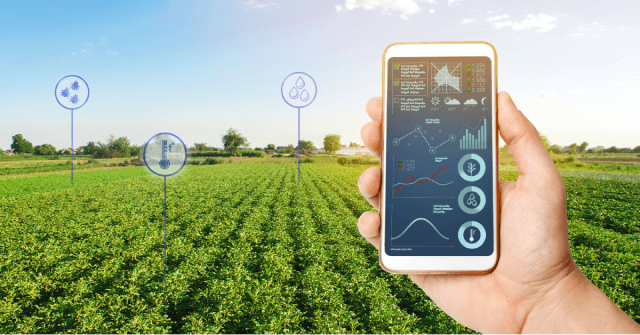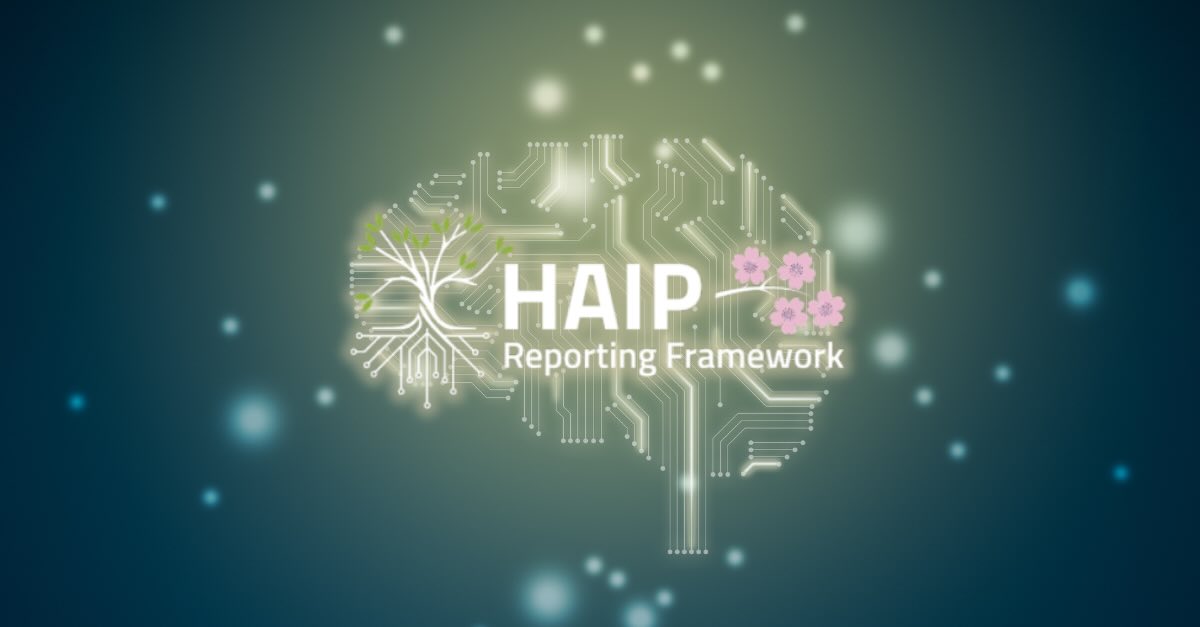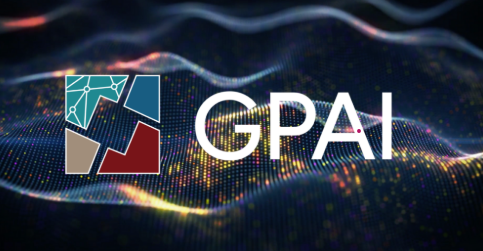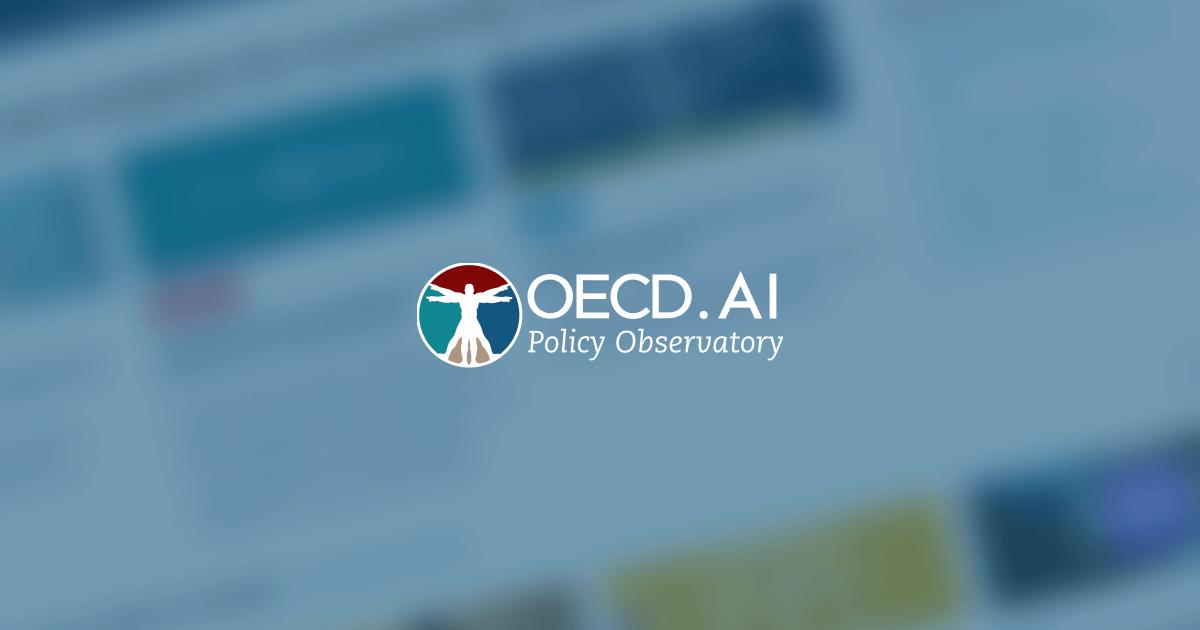Revisit AI-WIPS 2021 Conference:
📹 Watch video replays of each session below👇
| Overview | Opening Plenary (50 mins) | AI in our Futures: Stakeholder perspectives (45 mins) | Data highlight: Using live data on Al jobs and skills (30 mins) |
| Labour market | Conversation with David Autor (20 mins) | Conversation with Liz Reynolds (20 mins) | The impact of AI on the labour markets (60 mins) |
| Classification | The OECD Al Systems Classification Framework: progress, challenges and way forward (90 mins) | Developing and applying AI: Core and non-core AI (60 mins) | |
| AI diffusion | Conversation with Diane Coyle (30 mins) | AI diffusion in firms: what do we know and what does it mean for policy? (60 mins) | |
| AI performance | Human-machine collaborations: the role of AI (60 mins) | Conversation with Kenneth D. Forbus (30 mins) | Exploring assessments of AI capabilities (60 mins) |
| Skills | Using AI in training (60 mins) | Which (set of) skills to work with AI? (60 mins) | |
| Ethics | Ethics of AI in the workplace (60 mins) |
Overview
📹 Opening Plenary
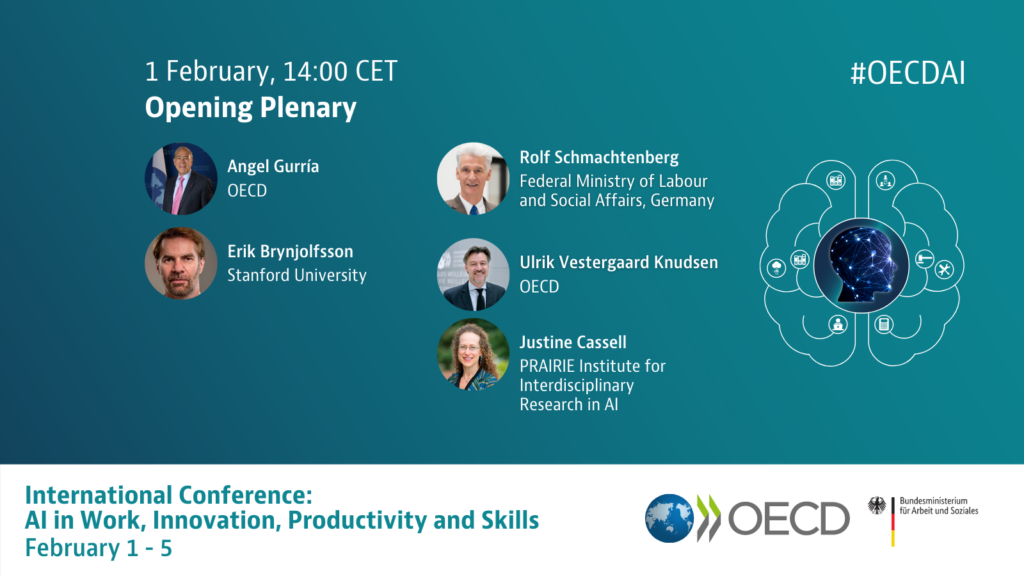
Description: 50 mins. AI is reshaping economies and societies across the world, offering new products and services, and promising to generate productivity gains, improve efficiency and lower costs. But the adoption of AI also raises questions and fuels anxieties; as AI transforms the way we work, we need to reflect how AI adoption in the workplace can be effective, beneficial, people-centred and accepted by the population at large. This opening session will set the scene for the week’s events, with opening remarks from senior OECD and German representatives and expert keynote addresses.
Speakers: Erik Brynjolfsson, Stanford University (presentation) | Justine Cassell, PRAIRIE Institute for Interdisciplinary Research in AI | Angel Gurría, OECD | Ulrik Vestergaard Knudsen, OECD | Rolf Schmachtenberg, German Federal Ministry of Labour and Social Affairs
📹 AI in our Futures: Stakeholder perspectives
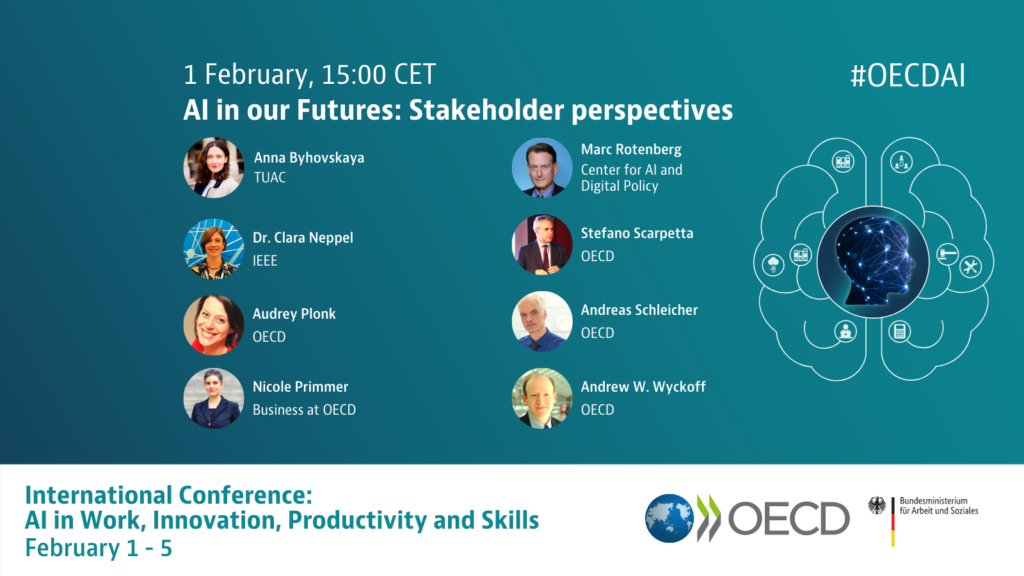
Description: 45 mins. As artificial intelligence reshapes our futures, what do OECD’s stakeholders consider to be the opportunities and challenges for work, innovation, productivity and skills? In this roundtable session, representatives from business (Business at OECD), labour (TUAC), civil society (CSISAC) and the technical community (ITAC) will share their views and offer insights from their communities on the evidence gaps and policy priorities where the OECD can advance the debate.
Speakers: Anna Byhovskaya, Trade union Advisory Committee to the OECD (TUAC) | Clara Neppel, IEEE | Audrey Plonk, OECD | Nicole Primmer, Business at OECD | Marc Rotenberg, Center for AI and Digital Policy | Stefano Scarpetta, OECD | Andreas Schleicher, OECD | Andrew W. Wyckoff, OECD
📹 Data highlight: Using live data on Al jobs and skills
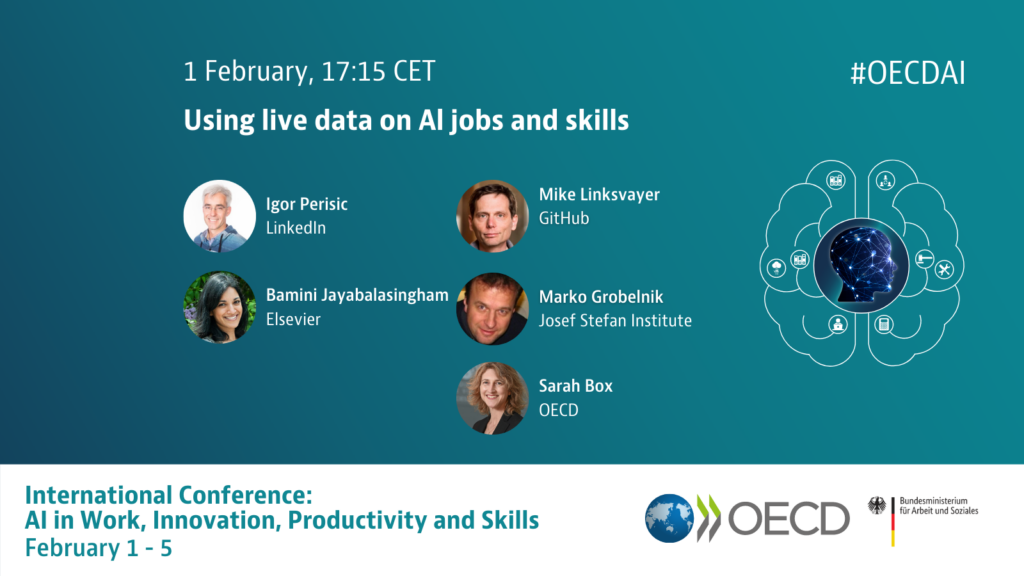
Description: 30 mins. As AI diffusion and adoption evolve apace, timely data on AI jobs and skills can help inform policy. The OECD will launch a set of new indicators and interactive visualisations showing demand for AI jobs and skills by country, AI skills penetration and migration, women in AI R&D, AI software development skills and more. This session will feature a short demonstration of new interactive datasets available on the OECD’s AI Policy Observatory (OECD.AI), followed by an exchange with OECD.AI data partners.
Speakers: Sarah Box, OECD | Marko Grobelnik, Josef Stefan Institute | Bamini Jayabalasingham, Elsevier | Mike Linksvayer, GitHub | Igor Perisic Linkedin
Labour Markets
📹 Conversation with David Autor
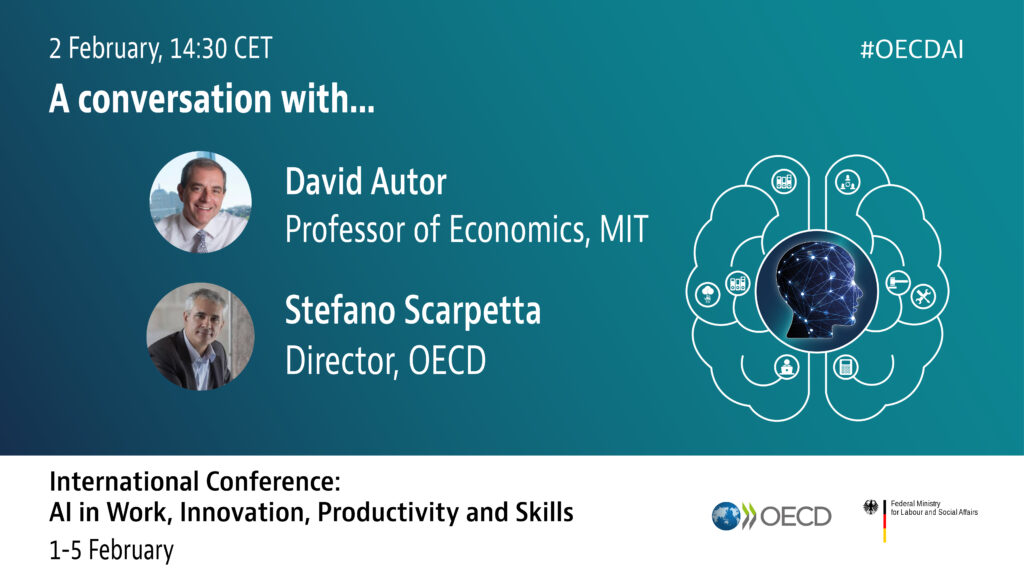
Description: 20 mins. Stefano Scarpetta, Director for Employment, Labour and Social Affairs at the OECD, will be speaking to David Autor, Ford Professor and Associate Head at the MIT Department of Economics, about the history and future of workplace automation. What do we know? And where are the gaps in the evidence if we want to build evidence-based policy?
Speakers: David Autor, MIT | Stefano Scarpetta, OECD
📹 Conversation with Liz Reynolds
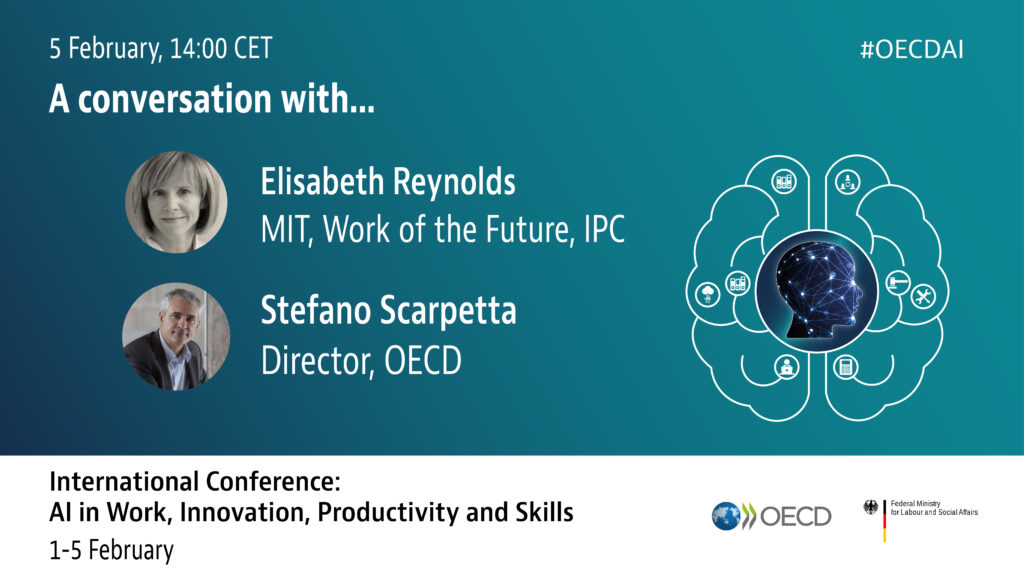
Description: 20 mins. Stefano Scarpetta, Director for Employment, Labour and Social Affairs at the OECD, will be speaking to Elisabeth Reynolds, Executive Director of the MIT Task Force on the Work of the Future, about her recent report “The Work of the Future: Building Better Jobs in an Age of Intelligent Machines” and how she sees the impact of AI play out in the labour market.
Speakers: Elisabeth Reynolds, MIT Work of the Future and IPC | Stefano Scarpetta, OECD
📹 The impact of AI on the labour markets
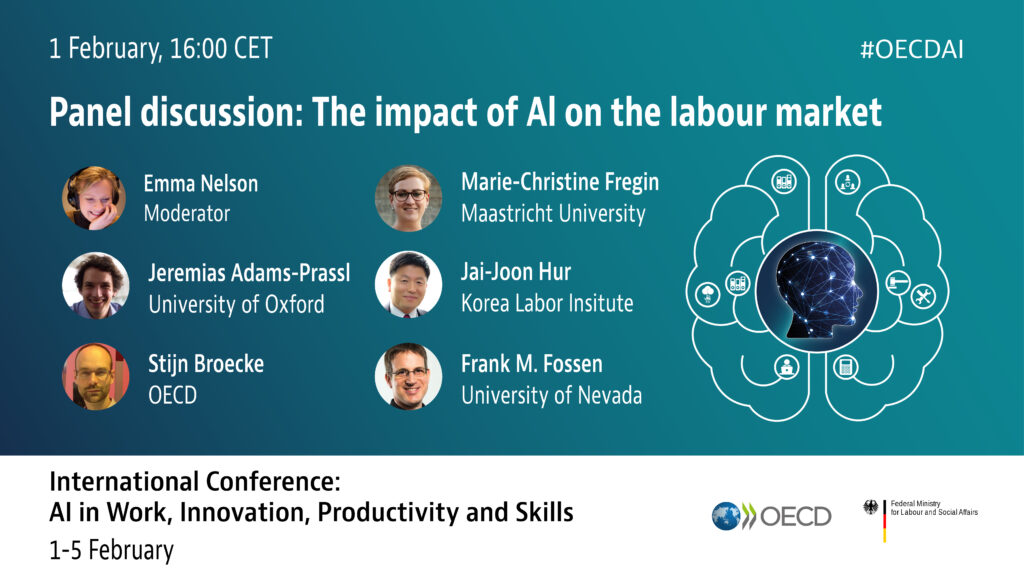
Description: 60 mins. What do we know about the impact of AI on the labour market? Will it further automate jobs and, if so, which ones? Will it improve job quality, or worsen it? And what will AI mean for disparities in the labour market? Will we be able to harness the opportunities that it offers to reduce inequalities or will we instead see inequality rise even further? This session will take stock of what we know about the impact of AI on the labour market and what we might expect to see in the future, including as a result of the Covid-19 crisis.
Speakers: Jeremias Adams-Prassl, University of Oxford | Stijn Broecke, OECD | Frank M. Fossen, University of Nevada, Reno | Marie-Christine Fregin, Maastricht University | Jai-Joon Hur, Korea Labor Institute | Emma Nelson, Moderator
Classification
📹 The OECD Al Systems Classification Framework: progress, challenges and way forward
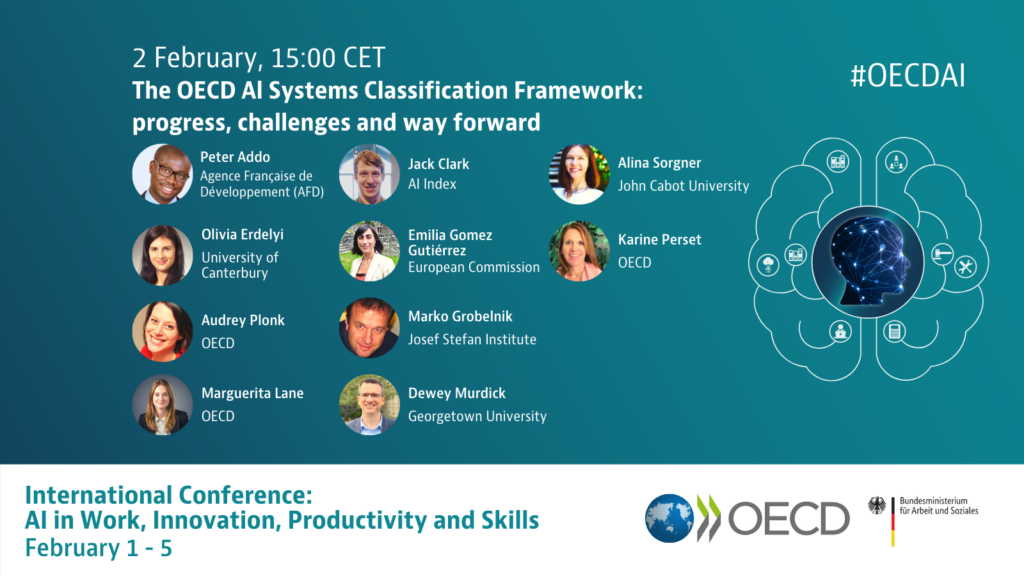
Description: 90 mins. Download session presentation. The OECD’s Network of Experts on AI developed a user-friendly framework to classify AI systems. It provides a structure for assessing and classifying AI systems according to their impact on public policy following the OECD AI Principles. This session discusses the four dimensions of the draft OECD AI Systems Classification Framework, illustrates the usefulness of the framework using concrete AI systems as examples, and seeks feedback and comments to support finalisation of the framework. Aclassification framework to understand the labour market impact will also be introduced.
Speakers: Peter Addo, Agence Française de Développement (AFD) | Jack Clark, AI Index | Olivia Erdelyi, University of Canterbury | Emilia Gomez Gutiérrez, European Commission DG Joint Research Centre (JRC) | Marko Grobelnik, Josef Stefan Institute | Marguerita Lane, OECD | Dewey Murdick, Georgetown University | Karine Perset, OECD | Audrey Plonk, OECD | Alina Sorgner, John Cabot University
📹 Developing and applying AI: Core and non-core AI
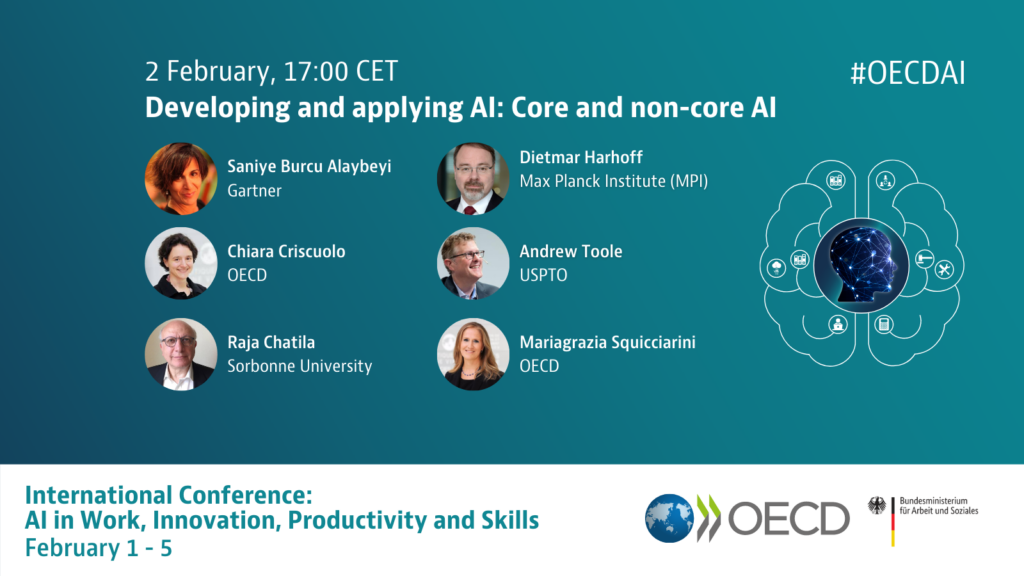
Description: 60 mins. AI technologies are still in their relative infancy but already promise to have a strong effect on production and, consequently, jobs. To help understand the state of the art and the directions AI will take, this session will discuss how to distinguish core versus non-core (i.e. applications) AI-related developments. It will further discuss experimental evidence based on web-reading at scale about the economic agents (i.e. firms, universities, etc.) that are active in the AI space, as well as research using trademark data to shed light on firms developing and positioning AI-related goods and services in the marketplace. Panellists will discuss ongoing approaches and help explore ways forward to deepen our understanding.
Speakers: Saniye Burcu Alaybeyi, Gartner | Raja Chatila, Sorbonne University | Chiara Criscuolo, OECD | Dietmar Harhoff, Max Planck Institute (MPI) | Mariagrazia Squicciarini, OECD (presentation) | Andrew Toole, USPTO
Diffusion
📹 Conversation with Diane Coyle
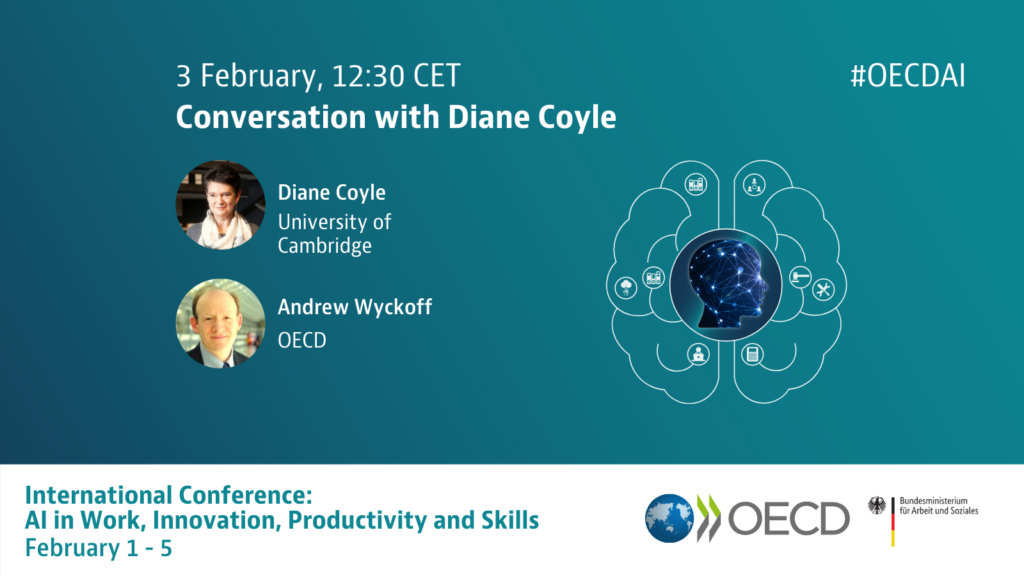
Description: 30 mins. In this session, the University of Cambridge’s Bennett Professor of Public Policy, Diane Coyle, will speak with OECD Director of Science, Technology and Innovation, Andrew Wyckoff, about her views on AI and productivity, the technology’s impacts on digital markets and competition, and the potential implications of AI’s diffusion for achieving social objectives.
Speakers: Diane Coyle, University of Cambridge | Andrew W. Wyckoff, OECD
📹 AI diffusion in firms: what do we know and what does it mean for policy?
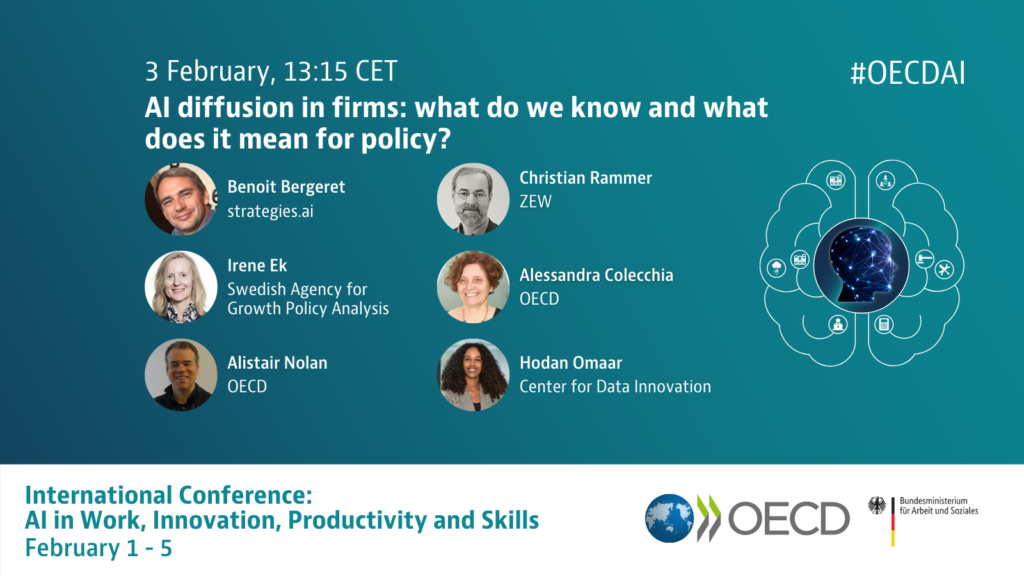
Description: 60 mins. New and emerging applications of AI systems are proliferating, yet development, diffusion and use of AI technologies are still at a relatively early level of maturity across many countries and firms. This session aims to explore the current understanding and knowledge gaps on the dynamics and drivers of AI diffusion, the factors affecting diffusion and the type of AI used by firms. This will inform the development and implementation of a survey of AI use by business being carried out under the AI-WIPS project.
Speakers: Benoit Bergeret, strategies.ai (presentation) | Alessandra Colecchia, OECD | Irene Ek, Swedish Agency for Growth Policy Analysis (presentation) | Alistair Nolan, OECD | Hodan Omaar, Center for Data Innovation (presentation) | Christian Rammer, ZEW (presentation)
AI Performance
📹 Human-machine collaborations: the role of AI
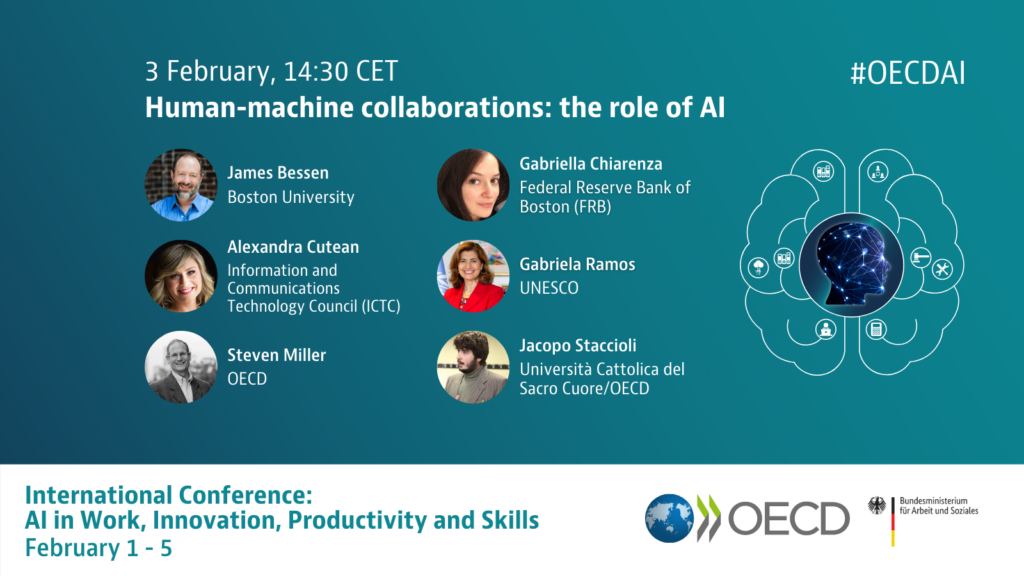
Description: 60 mins. This session will discuss experimental approaches aimed at assessing the possibility for humans and machines to work side by side, and to identify those instances in which automation and AI may make workers redundant. The discussion will be informed by novel evidence on labour-substituting technologies that have been appearing on the market over the last 30 years, with a special focus on those commercialised over the last few years. As these technologies are sold on global markets they can directly or indirectly (through global value chains and input substitution) lead to some tasks (and possible occupations) becoming redundant. The discussion will also focus on how humans and machines can work side by side, and how technologies may become labour augmenting.
Speakers: James Bessen, Boston University | Gabriella Chiarenza, Federal Reserve Bank of Boston (FRB) | Alexandra Cutean, Information and Communications Technology Council (ICTC) | Steven Miller, Singapore Management University | Gabriela Ramos, UNESCO | Jacopo Staccioli, Università Cattolica del Sacro Cuore/OECD (presentation)
📹 Conversation with Kenneth D. Forbus
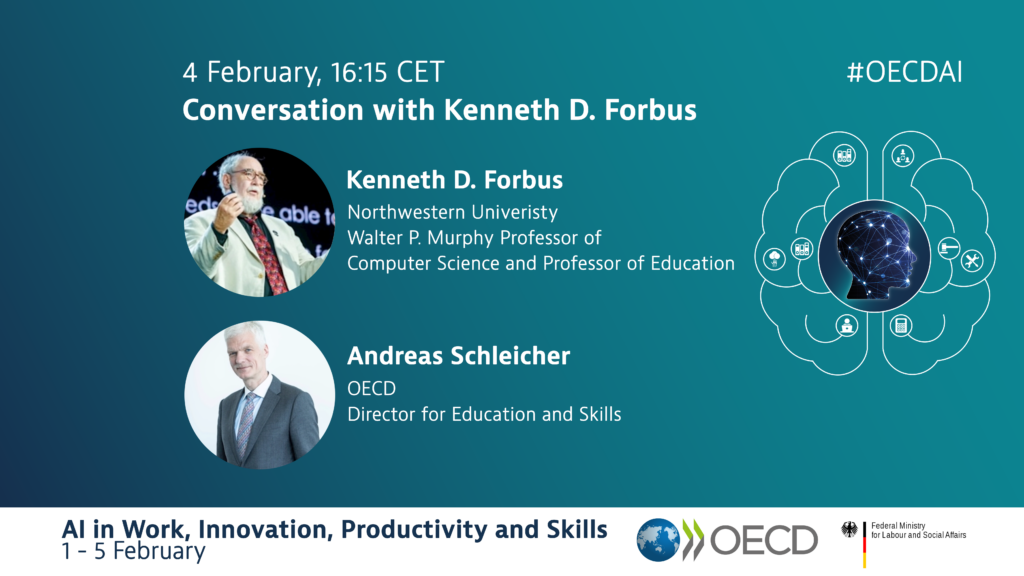
Description: 30 mins. This keynote by Kenneth D. Forbus, Northwestern University, moderated by OECD Director for Education and Skills, Andreas Schleicher, will present an innovative analysis on the key ways AI capabilities currently fall short of human capabilities and describe the current work in AI that addresses those limitations.
Speakers: Kenneth D. Forbus, Northwestern University | Andreas Schleicher, OECD
📹 Exploring assessments of AI capabilities
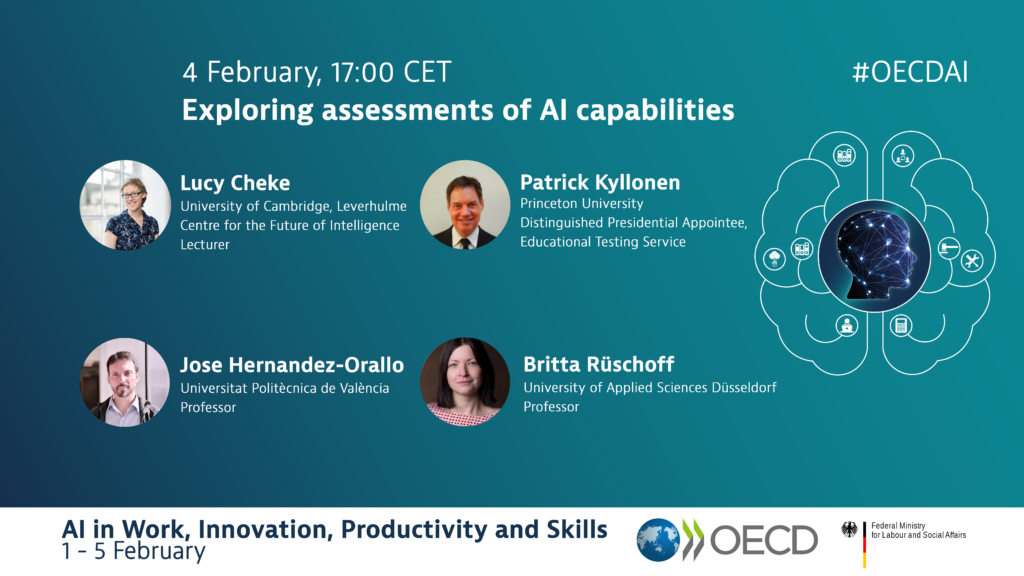
Description: 60 mins. This session will discuss the approach of the OECD’s Future of Skills project to assessing AI capabilities and discuss examples of alternative tests available from education, occupational certification, cognitive psychology, and animal cognition.
Speakers: Lucy Cheke, University of Cambridge (presentation) | Jose Hernandez-Orallo, Universitat Politècnica de València (presentation) | Patrick Kyllonen, Princeton University (presentation) | Britta Rüschoff, University of Applied Sciences Düsseldorf (presentation)
Skills
📹 Using AI in training
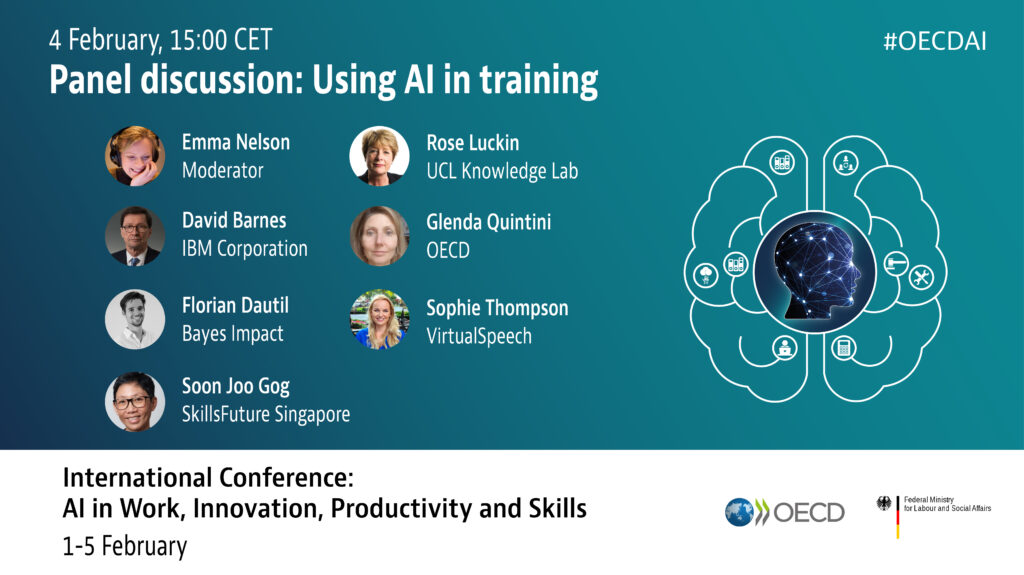
Description: 60 mins. Technologies and tools using AI have the potential to change how people learn by helping to identify training needs, tailor training content, deliver training in innovative ways, and assess learning outcomes. However, the use of AI for training may also suffer from important drawbacks, notably the fact that the cost and complexity of AI technologies could limit access to a selected few. In this session, panellists will discuss how AI can be used for education and training purposes, and explore opportunities and challenges in this context.
Speakers: David Barnes, IBM Corporation | Florian Dautil, Bayes Impact | Soon-Joo Gog, SkillsFuture Singapore | Rosemary (Rose) Luckin, University College London | Emma Nelson, Moderator | Glenda Quintini, OECD | Sophie Thompson, VirtualSpeech
📹 Which (set of) skills to work with AI?
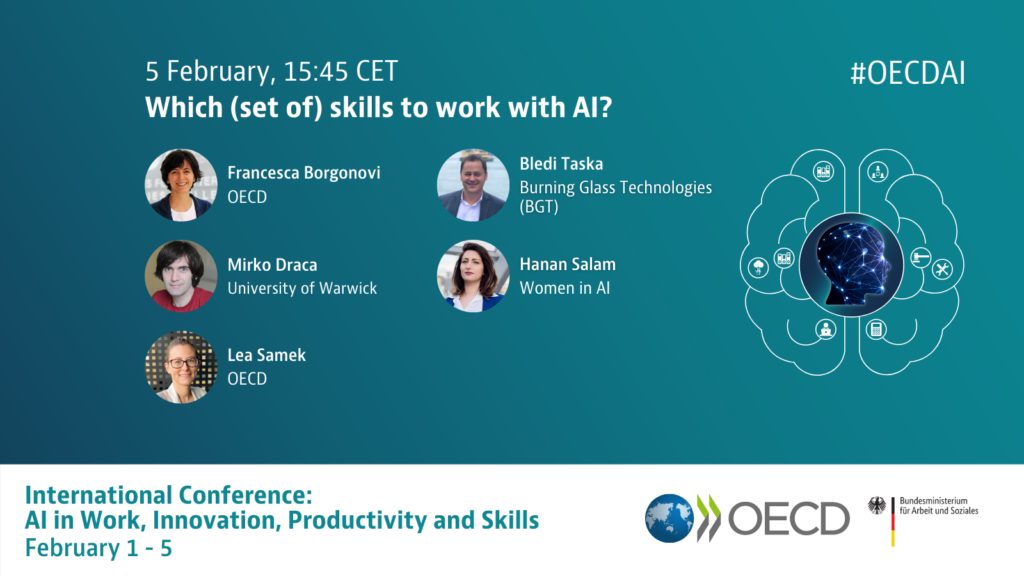
Description: 60 mins. This session will discuss emerging evidence on the human capital needed to work with AI and, in particular, on the (set of) skills and competences characterising AI-related jobs, shedding light on the occupations and sectors demanding the cognitive and socio-emotional skills required to work with AI.
Speakers: Francesca Borgonovi, OECD | Mirko Draca, University of Warwick | Hanan Salam, Women in AI | Lea Samek, OECD (presentation) | Bledi Taska, Burning Glass Technologies (BGT)
Ethics
📹 Ethics of AI in the workplace
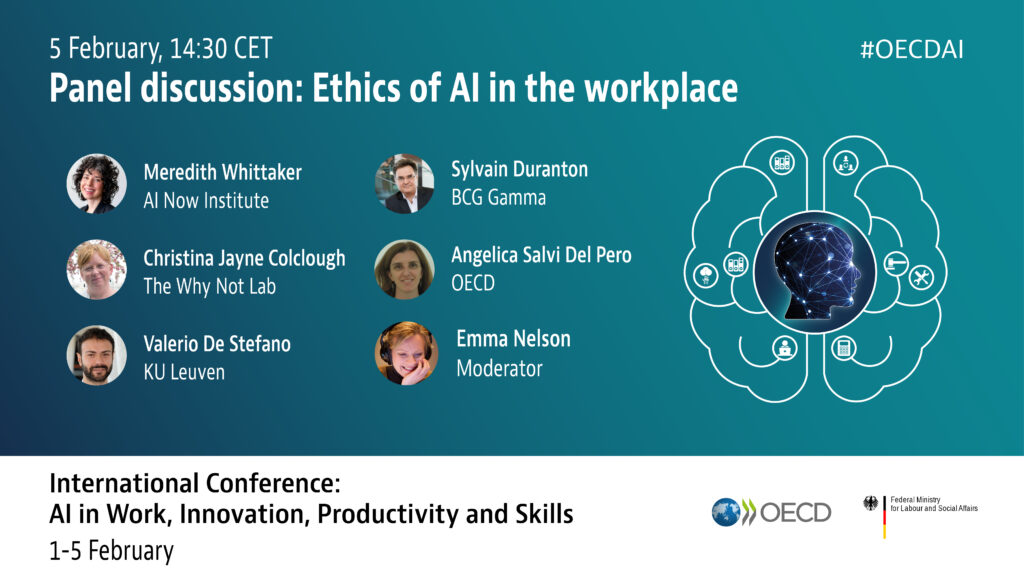
Description: 60 mins. What are the main ethical issues raised by the use of AI in the workplace? What tools can be used to make sure that humans are put first – and human centred values respected – when AI is used in the workplace? What safeguards should be considered to ensure transparency, explainability, safety and accountability? This are some of the questions that panellists will be called to discuss. The panel discussion will be followed by Q&A.
Speakers: Christina Jayne Colclough, The Why Not Lab | Valerio De Stefano, KU Leuven | Sylvain Duranton, BCG Gamma | Emma Nelson, Moderator | Angelica Salvi Del Pero, OECD | Meredith Whittaker, AI Now Institute, New York University



